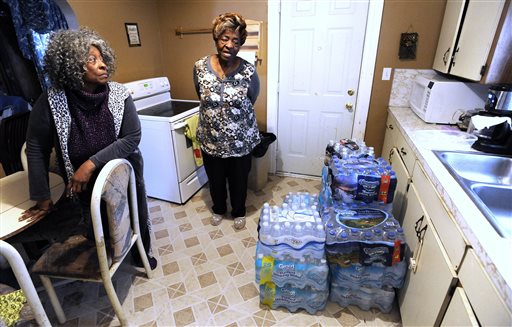GRAND RAPIDS, Mich. (AP) — Michigan Gov. Rick Snyder on Friday signed into law $28 million more in emergency funding to address Flint’s lead-contaminated water.
It’s the second round of state aid for the city since the crisis was confirmed in the fall, bringing the total allocated to nearly $39 million. The Republican governor said the funding will provide immediate resources in Flint, but is not the end of state assistance.
Improperly treated water leached lead from pipes into drinking water after Flint switched from Detroit’s water system to the Flint River in 2014 to save money while under state financial management. The switch was supposed to be an interim move until the completion of a new pipeline from Lake Huron.
Flint has reconnected to Detroit’s system for now.
“It’s time to stand up and recognize that things could have been done differently,” Snyder said before signing the legislation at the annual meeting of the Michigan Press Association in Grand Rapids. “Mistakes were made. … We’re going to solve them.”
Snyder has accepted responsibility for the emergency while also blaming state and federal environmental regulators, some of whom have resigned or have been suspended. But he remains the target of criticism, including longshot efforts to recall him from office. In pledging again to fix the problem, he said, “how do you learn from things that didn’t go right to be even stronger and better for the long term?”
After the switch to using the Flint River, state regulators failed to ensure the new water was properly treated and lead from pipes leached into the water supply. Some children’s blood has tested positive for lead, which has been linked to learning disabilities, lower IQ and behavioral problems.
The state funding is intended to pay for bottled water, faucet filters, testing kits, additional school nurses, medical treatment and to help the city with unpaid water bills. There also is funding to hire outside experts to assess whether Flint’s water system infrastructure must be replaced or repaired.
On Thursday, U.S. Senate Democrats proposed up to $400 million in emergency federal aid for Flint — contingent on the state matching the funds dollar for dollar.
An assessment cited in Michigan’s request for a federal disaster declaration estimated the potential cost of fixing the damage to Flint’s water distribution infrastructure at $713 million. Snyder and the Republicans who control the state Legislature have said it’s too early to talk about wholesale replacement of the pipes.
Also Friday, Snyder said he was not aware that the state had been offering bottled water for employees at a state office building in Flint last year while telling other residents that the city’s tap water was safe to drink.
The agency that manages state buildings said Thursday water coolers were introduced at the building after Flint flunked some drinking water standards not related to lead.
Snyder told WWJ-AM that he had “no knowledge of that taking place.”
___
Eggert reported from Lansing, Michigan.
Copyright 2016 The Associated Press. All rights reserved. This material may not be published, broadcast, rewritten or redistributed.









.jpg)